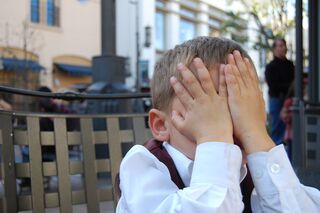Embarrassment
This Sexual Behavior Is Part of Natural Development
How to teach children to manage behavior without inspiring guilt or shame.
Posted June 26, 2021 Reviewed by Vanessa Lancaster

Four-year-old Grace is lying on the couch in the living room with her hand in her pants. Mom and Dad are very uncomfortable and are not sure what to do. On one hand, their discomfort makes them feel like yelling at her to stop. (Sometimes, this has to do with early childhood associations or prohibitions.) At the same time, they want her to grow up with a healthy approach to sexual pleasure. What can they do to handle the situation with care?
It’s important that parents understand that this behavior is part of natural development. When babies begin to explore their bodies as a part of their self-discovery, they quickly experience that touching themselves feels pleasurable. So, they repeat the behavior, and it continues throughout childhood. Sometimes a child masturbates for pleasure, but sometimes it is a self-soothing mechanism to cope with anxiety when they are tired or feel worried or insecure. The goal is to teach children how to manage this behavior, like other actions, without inspiring guilt or shame.
Set a limit. If your child is masturbating in the living room, you can start by acknowledging his feelings. You can say, “I know it feels good to touch yourself, but touching yourself is something that people do in private. You can do this in your room, in the bathroom, or when no one is around."
Be patient. Keep in mind that for younger children, masturbation can become a habit like sucking your thumb or biting your nails and is often done unconsciously. That is why it is very hard for a child to stop the behavior on a dime. Ultimately, children become more self-aware, and with your guidance, learn to masturbate only when they are alone. This is along the same line as learning to close the door for privacy when you’re in the bathroom.
Use distraction. It is often better to avoid confronting your child about her behavior too much. It can make a child anxious and even increase the behavior. Instead, you can distract her by redirecting her to another activity, such as playing a game or setting the table. Sometimes parents find that a combination of ignoring the behavior and engaging the child in another activity works very well.
Cover the bases. As I mentioned, a child may engage in masturbation as a self-soothing mechanism when he is anxious. This can happen when there is a new baby in the house, when he’s about to take a test, or even when he’s fought with his best friend. Therefore, it is important to talk with him about his feelings. For example, you can ask, “Is anything happening that is making you feel angry or worried? Let’s talk about it, and I will help you.” Helping children express their feelings verbally rather than through behavior helps them get the help they need and feel better.
Avoid shaming your child. Criticizing a child for masturbating gives the child the message that sexual pleasure is bad. This can cause children to feel guilty whenever they experience bodily pleasure and create problems later in their adult relationships. Once more, it can even cause an individual to feel guilty when experiencing other forms of pleasure, such as receiving a gift or buying a new car. Instead, helping children build a positive association to pleasure will give them a more joyful life.


